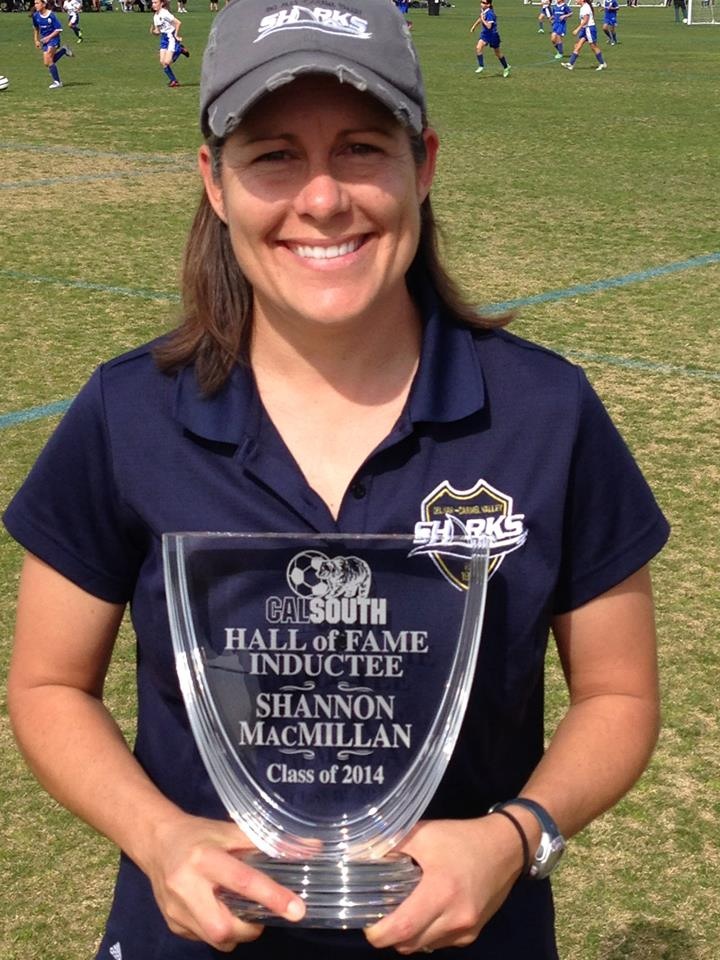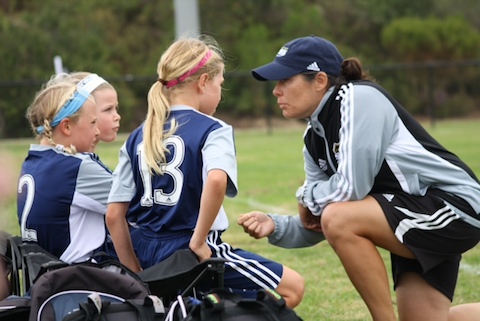Women’s World Cup Star & Leader in Youth Soccer, Shannon Mac Millan on the Future of Soccer
New SoccerToday Series on Leading the Way Forward Kicks Off
International Women’s Day may be celebrated only once a year, but great women deserve to be recognized all the time — and Shannon Mac Millan, FIFA Women’s World Cup champion, Olympic gold and silver medalist and 2016 National Soccer Hall of Fame Hall of Fame inductee, as well as Cal South Hall of Famer, is one of these leaders.
Mac Millan enjoyed a fabulous twelve-year career and is one of the few women running a youth soccer club in America. As a player, Mac Millan scored 60 goals for the USA, and perhaps the most memorable was in the semifinal of the 1996 Olympics where she scored the game-winner.
As the DMCV’s Director of Soccer Operations of Del Mar Carmel Valley Sharks (DMCV Sharks), San Diego native Mac Millan works to improve the quality of youth soccer and pass on her passion for the game to today’s youth soccer players.
“We cater to everyone that wants to play and everyone is treated as equal and nobody is more special than the others,” MacMillan has said.
The world of youth soccer is always changing — and SoccerToday’s Diane Scavuzzo asked Mac Millan for her insights on leading the way forward to a brighter future that encourages kids to be lifelong fans of the game of soccer.
Diane Scavuzzo: How can we make soccer the preeminent sport in America? What needs to change?
Shannon Mac Millan: I think on the women’s side it is! I also think that if we can continue to build an environment that is positive and healthy, soccer will continue to grow in America.
We have to be thoughtful about burning kids out and limiting their opportunities.
We are putting way too much pressure on kids at such an early age. Kids should love the game so much that they want to go out and play with friends at recess, for birthday parties, after school and on the weekend – not be worn out from their club ball.
Diane Scavuzzo: Youth soccer in America is a passion and a business. What are your thoughts on Pay-to-Play?
Shannon Mac Millan: It has definitely become a big business. The game has grown and evolved and there are so many coaches that are coaching full time, it is no longer just an after work part-time job.
I can say that at the Sharks, a player is NEVER denied the opportunity to play based on finances.
We are always open and willing to help families so that kids do not miss out.
Diane Scavuzzo: Do most coaches recognize their influence? The power they have to improve the quality of the game?
Shannon Mac Millan: I would certainly like to think they do recognize the scope of their potential influence and that they have the power to improve the quality of the game. If not, I would question their passion for the game and why they are even coaching and throwing away a golden opportunity to be a role model and teach and inspire!
Diane Scavuzzo: What are the biggest mistakes youth coaches in America make? Why do they make these mistakes?
Shannon Mac Millan: This is a tough one but I think one of the biggest things is they don’t allow players to think for themselves and problem solve out on the field.
We can’t be focused on the results and “joystick” the players – yelling at them and calling each and every play from the sidelines.
Let them play, let them make mistakes and challenge them to learn and grow from them!
Let them express themselves and enjoy the game.
As coaches/directors, we are teachers and we are blessed with the incredible gift of being able to help mold and inspire kids. We are role models and it is so important that we use this opportunity to affect these players lives in a positive way!

Diane Scavuzzo: Is the new U.S. Soccer license/education program making an impact in the right direction? What level is your license?
Shannon Mac Millan: I currently have a B license through U.S. Soccer. I do applaud U.S. Soccer for working to improve the education of coaches but I think currently the licensing is way too expensive and not as accessible as it should be for the higher levels.
San Diego is saturated with clubs yet there are rarely, if ever, higher level courses in the area.
The cost for the courses are steep, the travel involved is often difficult – from the time commitment to the additional costs associated for the travel – all make it difficult, especially for the newer/younger coaches getting started.
Diane Scavuzzo: What is the best way to teach?
Shannon Mac Millan: Personally, I think the best way to teach is to make sure you are reaching all of your players.
Some are verbal learners and you can tell them something and they will get it within the first couple attempts.
Some players are more visual learners and may need to see it drawn up before it really clicks. These players will benefit more from seeing something drawn up.
I also think one of the best ways to teach is to be able to “show” them which will help your visual learners!
As a coach, can you demonstrate in real time what you are asking of your players?
With that said, it is also important to realize that our players also have a lot of pressure on them from school, home and soccer – can you be in tune with your players and know when to challenge and push them or when to let them just play and use the game as a release?
I also believe it is important to let the players problem solve and figure things out on their own.

Diane Scavuzzo: How big is DMCV Sharks today? How many teams does your club have now?
Shannon Mac Millan: We have about 65 competitive teams and 120 recreational teams with about 35 coaches.
Our recreational program relies on volunteer coaches, parents, and we are so grateful for the continued support and time that they all give to our players.
Our club culture is one that looks to help kids at all levels, from recreational to competitive to elite, grow and learn both on the field and off.
We look to help them extract life lessons such as teamwork, leadership, overcoming adversity, and confidence so that they can succeed in whatever they choose to do later in life and beyond soccer.
Our focus is not on results in the games but more on if our coaches and players are learning and growing and building their passion for the game.
Diane Scavuzzo: What are you doing to help the sport grow?
Shannon Mac Millan: Soccer has been amazing to me – it has paid for my education, allowed me to travel the world, taught me so many incredible life lessons, afforded me some amazing friendships for life, and obviously had the honor of playing in and winning Olympic games and a World Cup – so it is incredibly important for me to give back to the game and help it continue to grow.
I’m doing this by coaching and running a youth club, the DMCV Sharks.
I also give talks and speak at conventions and schools about the beautiful game and how it can empower players, especially young women.






